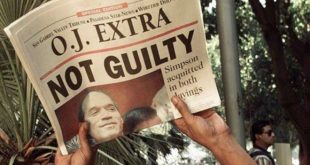Once upon a time, brothers-in-law William Procter and James Gamble sold candles and soap. Their 19th-century family business grew into the largest consumer goods conglomerate in the world — launching the most recognizable brands on our grocery shelves, including Tide, Pampers, Crest, Nyquil and Old Spice.
Now, Procter & Gamble want to conquer a new market: identity-politics pandering.
Industry marketers aren’t satisfied with selling useful products people want and need. They’re hell-bent on transforming successful businesses into social justice busybodies.
P&G’s “My Black is Beautiful” campaign released a new video last week called, “The Talk.” It “depicts the inevitable conversations many Black parents have with their children about racial bias to prepare, protect and encourage them” across the decades. The ad plays as a kinder, gentler version of Black Lives Matter propaganda, but the underlying themes are the same:
—Little progress has been made since the days of Jim Crow.
—Racial discrimination against black Americans is inevitable.
—Police officers are the enemy.
One especially offensive scene depicts a suburban black mom preparing her bubbly teenage daughter, a new driver, for “when you get pulled over.” Not “if,” you see, but “when.”
As the daughter laughs her off, the mom gravely warns: “This is not about you getting a ticket. This is about you not coming home.”
Because racist predator cops lurk on every corner, plotting to kidnap and kill black girls just trying to get to Forever 21? Really, Procter & Gamble?
Way to alienate the millions of law enforcement families — of all colors — who purchase your goods.
Naturally, media virtue signalers lavished praise on the corporate virtue signalers. It’s a veritable virtue signaling bacchanalia.
Adweek raved that the video was “powerful.” The Dallas Morning News cooed:
“The ad is a bold move, and the fact that a Fortune 100 company includes this cultural experience in an ad campaign not only acknowledges that the experience is real, but that it’s important to a mass audience.”
Yes, racial discrimination still exists. Yes, parents of all races and ethnicities must expose their children to hard truths about people who will judge them by their skin color, eye shape, socioeconomic status, physical stature and IQ instead of by their character.
But if inclusion, diversity and candid talk are such cherished values at P&G, when will they be airing bold videos about the brutal treatment Asian-American high school students have suffered at the hands of bigoted black students in Philadelphia over the past decade?
Or about the targeting of young female Asian Americans and elderly Asian-American crime victims by black gang members in New York and San Francisco?
Or on the long-simmering tensions between blacks and Latinos and blacks and Koreans in Los Angeles?
Or how about decrying the prejudice against multiracial children who are mocked for looking “too white”? Talk to black basketball star, Mike Conley, who was forced to fend off haters this week who attacked his white wife and their biracial 1-year-old baby.
Or how about monstrous, race-based hate crimes such as the kidnapping and assault of a mentally disabled white teenage boy by black thugs in Chicago who tortured him and forced him to declare on video “I love black people” and “F—- white people”?
Or how about the increasingly vile campaigns on college campuses celebrating a “Day Without White People,” stereotyping diverse individuals under the dread banner of “white privilege,” condemning those who believe in color-blindness as “unethical,” and separating minorities into racially segregated dorms, classes and graduation ceremonies in the name of social justice?
P&G should stand for quality consumer goods, not empty Protest & Grumble that divides more than it unites.
If P&G isn’t willing to tackle the full complexity of race relations in 21st-century America, perhaps the company should stick to selling diapers instead of filling them.
COPYRIGHT 2017 CREATORS.COM
 Michelle Malkin is host of “Michelle Malkin Investigates” on CRTV.com. Her e-mail address is writemalkin@gmail.com.
Michelle Malkin is host of “Michelle Malkin Investigates” on CRTV.com. Her e-mail address is writemalkin@gmail.com.
The views expressed in opinion articles are solely those of the author and are not necessarily either shared or endorsed by Black Community News.
 Black Community News News and Commentary for Christians
Black Community News News and Commentary for Christians




—Little progress has been made since the days of Jim Crow. – no it doesn’t say that. It only says the potential is there. If you can’t see that pockets of racism still exist, you are blind.
—Racial discrimination against black Americans is inevitable. – no it doesn’t say that. First it shows what to do because it has already happened. Then it shows what if do if it happens. It says nothing about it being inevitable.
—Police officers are the enemy – no it doesn’t say that. It says you may encounter a police officer or other people who treats you differently – a fact that is true around this country even today. Nowhere does it say all police are the enemy.
The criticism is hyper-inflate empty hyperbole.
Procter & Gamble is making a noble effort toward racial harmony in this ad campaign. They’re not trying to divide people by merely pointing out facts.